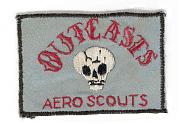In spite of the frequent rhetoric about "another Vietnam," etc., the author makes a case that the GWOT is best compared to the Indian Wars. Agree or disagree I found the comparison interesting.
The Global War on Terror (GWOT) is, like all historical events, unique. But both its supporters and opponents compare it to past U.S. military conflicts. The Bush administration and the neocons have drawn parallels between GWOT and World War II as well as GWOT and the Cold War. Joshua E. London, writing in the National Review, sees the War on Terror as a modern form of the struggle against the Barbary pirates. Vietnam and the Spanish-American War have been preferred analogies for other commentators. A Pulitzer-prize winning journalist, Anne Applebaum, says that the war in Iraq might be like that in Korea, because of "the ambivalence of their conclusions." For others, the War on Terror, with its loose rhetoric, brings to mind the "war on poverty" or the "war on drugs."
I'd like to suggest another way of looking at the War on Terror: as a twenty-first century continuation of, or replication of, the American Indian wars, on a global scale. This is by no means something that has occurred to me alone, but it has received relatively little attention. Here are ten reasons why I'm making this suggestion:
Complete article here:
http://www.commondreams.org/views06/0120-20.htm







Bookmarks